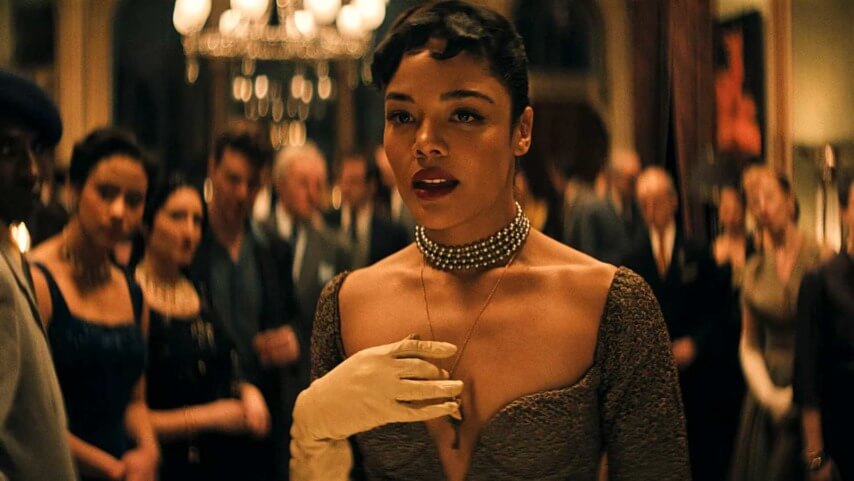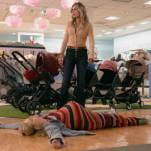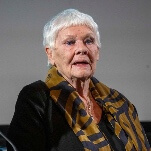Nia DaCosta’s 2018 debut feature Little Woods, which stars Tessa Thompson and Lily James as sisters who must turn to crime to secure dignified lives for themselves, is the only time the filmmaker has committed an original story to screen. She followed that film with the Jordan Peele-produced remake of Candyman (originally based on a Clive Barker short story) before being tapped to helm The Marvels in 2023. Though The Marvels has the distinction of being the highest-grossing film directed by a Black woman, neither of those IP films made much impact, which easily indicate an artist whose strengths are found in original storytelling. Yet with Hedda, DaCosta’s adaptation of Henrik Ibsen’s play Hedda Gabler, it’s clear that given fertile source material to riff upon, she is more than capable of creating a riveting interpretation all her own.
Incorporating issues of class, queerness, and gender (though never heavy-handedly) and swapping 19th-century Oslo for 1950s England, Hedda retains Ibsen’s palpable intrigue into the then-burgeoning study of psychology (it’s rumored that Freud was heavily influenced by the play). Yet Hedda never veers into careless depictions of a “neurotic” woman, nor does it feel weighed down by its characters’ intersectional power struggles. A well-rounded cast, impeccable sense of pacing, and elaborate costume design turn an intensely intimate play into a thrilling cinematic spectacle.
Thompson reunites with DaCosta, embodying Hedda with venom and charm. Yet, from the film’s first moments, she’s deeply unstable. George Tesman (Tom Bateman) calls his new bride’s name across their sprawling estate, unable to locate her. He hollers about a phone call from Eileen Lovborg (Nina Hoss), this name being the only thing that causes Hedda to emerge from a murky pond on the property. Clad in heavy garments, she haphazardly tosses large stones from her pockets. Clearly, Eileen means a hell of a lot to an otherwise despondent lady of the house, who snaps into action after her caller confirms that she’ll be at the blow-out bash Hedda has committed to hosting later that evening.
It’s immediately evident that Hedda feels indifferently about her husband, who in turn is mad with devotion. Head housekeeper Bertie (a brief yet perfectly cast Kathryn Hunter) reveals to her co-workers that George bought the impressive abode in order to please Hedda, but has no way of actually financing it. This is why the sharply-dressed yet snakelike Judge Brack (Nicholas Pinnock) has paid a visit hours before he’s expected for the night’s event, as George hopes he can assist with a sizable loan. This will temporarily suffice until George secures a prestigious teaching position at a local university, which would alleviate the couple’s economic precarity. Then again, Eileen is also a frontrunner for the job, as Hedda learns from Thea (Imogen Poots), a former schoolmate who now acts as Eileen’s creative collaborator. Thea arrived at the home somewhat unexpectedly, unaware that such a lavish soiree was set for that evening, only that Eileen would be in attendance. Hedda offers to loan her a gown for the occasion, a gesture that at first feels amicable before revealing thinly-veiled contempt. Thea left her husband to be with Eileen—a social sin of the highest order. Despite this brave move, Thea is meek, something that Hedda quickly identifies for exploitation.
The mental state of Thompson’s character is never overtly articulated, but this makes following along with her antics all the more engrossing. She’s a natural puppet master to her complex surroundings, provoking reactions in people that will, in her mind, inch her closer to the life she deserves. When Eileen finally arrives at the shindig—which at this point is in full swing with a kinetic live band, mountains of champagne, and handsy houseguests—wheels have already been set in motion to disrupt her relationship with Thea. The shocking developments that follow aren’t orchestrated by a jilted lover or neglected housewife, but rather by a deeply bored individual whose listlessness manifests as merciless psychological warfare.
Thompson embodies Hedda with a playful, ruthless energy, an unsettling combination that makes it impossible to parse any given action. She’s also impossible not to be enthralled by, donning a deep-cut, off-the-shoulder evening gown that’s accentuated by a multi-tiered choker necklace. Her beauty is only rivaled by that of Eileen, who wears a sheer, white organza shawl secured to her torso by cutouts strategically positioned atop her breasts. The women flirt all evening—with each other, with their dates, with conventions of what they as women ought to be doing at a high-society event—but even these schemers are no match for the impulses of drunk, disorderly, and hedonistic partygoers.
The flow of Ibsen’s original text is largely unaltered, save for the decision to change the male character of Eilert to Eileen. This was previously attempted by a 2009 production of Hedda Gabler staged by Mauckingbird Theatre Company, a Philly-based outfit which reimagines iconic dramas through a queer lens. Though that adaptation received lukewarm reviews, DaCosta deftly handles this modification. The gender-bent slant raises a crucial question about Hedda’s dissatisfaction with what otherwise seems to be a fine marriage: She assumed she needed to bow to social conventions, yet Thea and Eileen’s relationship defies this supposition. Enraged that she willingly walked into a trap she felt was unavoidable, Hedda just has to fuck shit up. Simply put, there is nothing polite about Hedda—adultery, drug use, and suicide are all integral to the story—but the grit beneath the opulent glamour of this estate is what makes spending an extended evening within its walls so exciting.
Director: Nia DaCosta
Writer: Nia DaCosta
Starring: Tessa Thompson, Imogen Poots, Tom Bateman, Nicholas Pinnock, Nina Hoss
Release Date: October 22, 2025; October 29, 2025 (Amazon Prime Video)








































